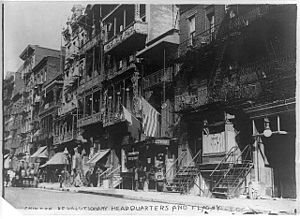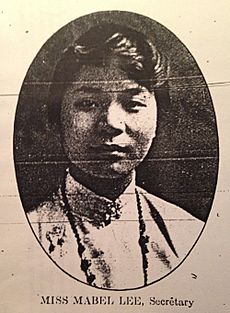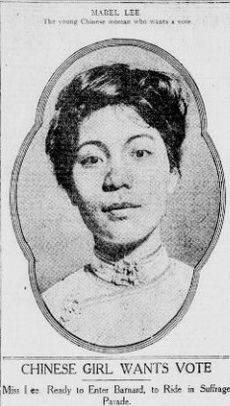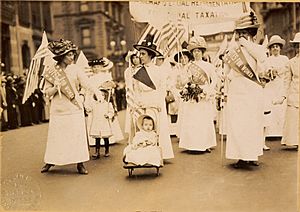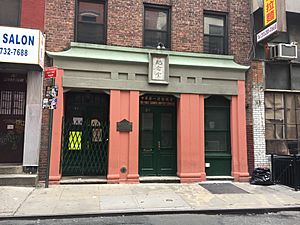Mabel Ping-Hua Lee facts for kids
Quick facts for kids
Mabel Ping-Hua Lee
|
|||||||||||
|---|---|---|---|---|---|---|---|---|---|---|---|
| 李彬华 | |||||||||||
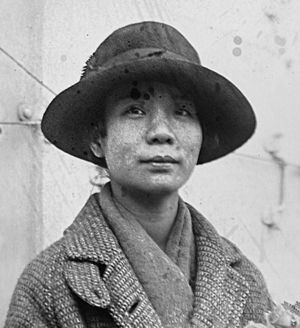
Lee c. 1923–1925
|
|||||||||||
| Born | October 7, 1896 |
||||||||||
| Died | 1966 (aged 69–70) New York City, U.S.
|
||||||||||
| Education | Barnard College (BA; MEd) Columbia University (PhD) |
||||||||||
| Chinese name | |||||||||||
| Chinese | 李彬华 | ||||||||||
|
|||||||||||
Mabel Ping-Hua Lee (Chinese: 李彬华; October 7, 1896 – 1966) was a Chinese-American woman who worked hard for women's rights. She was also a minister. She fought for women to have the right to vote in the United States.
Later in her life, Mabel Lee became a Baptist minister. She worked at the First Chinese Baptist Church in Chinatown, New York City.
Mabel was born in China but grew up in New York City. She earned two degrees from Barnard College and Columbia University. In 1921, she received a special doctorate degree in economics from Columbia University. She was the first Chinese woman in the U.S. to earn such a degree in economics.
In the 1910s, Mabel became a strong supporter of women's right to vote. She even rode a horse in a big parade in New York City in 1912 to support this cause. Even after the Nineteenth Amendment passed in 1920, giving women the right to vote, Mabel could not vote. This was because she was a Chinese immigrant, and the Chinese Exclusion Act stopped Chinese people from becoming citizens. She finally gained the right to vote after the Magnuson Act passed in 1943.
Mabel became a Baptist minister in 1924. She took over her father's church after he passed away. She led the First Chinese Baptist Church for forty years. She also became an important leader in the American Baptist Home Mission Society. Mabel also helped the Chinese community in New York and the people living in Chinatown. She worked with the Chinese Community Center. In 2017, the Chinatown U.S. Post Office on Doyers Street was renamed in her honor. This was to remember her life and her work for women and Chinese immigrants in the United States.
Contents
Early Life and Education
Mabel Ping-Hua Lee was born on October 7, 1896, in Guangzhou, China. This was during the Qing dynasty. Her father, Lee To, was a minister who moved to the United States. He worked with the American Baptist Home Mission Society. He first served Chinese communities in Washington state in 1898. Later, he became a minister at the Morning Star Mission in New York City. He became a key leader in New York's Chinatown.
Mabel spent her early childhood in China. She went to a missionary school where she learned English. Her mother and grandmother raised her while her father was in America. She moved to America with her mother around 1905 to join her father. Her family lived in a building at 53 Bayard Street in Chinatown. She went to public schools in New York City, including Erasmus Hall High School in Brooklyn. This school helped many immigrant children.
College and Advanced Degrees
In 1913, Mabel Lee started attending Barnard College. She studied history and philosophy. She joined the Debating Club and the Chinese Students' Association. She wrote articles for The Chinese Students’ Monthly. In these articles, she strongly supported women's right to vote. She argued that equality was needed for a true democracy. While at Barnard College, she also earned a master's degree in educational administration.
In 1917, Mabel was accepted to Columbia University. She planned to earn a doctorate in economics. The Chinese government was impressed with her studies in farming economics. They gave her a special Boxer Indemnity Scholarship. This allowed her to continue her studies. She was the first woman to receive this scholarship. She became the vice president of the Columbia Chinese Club. She also became an editor for The Chinese Students’ Monthly.
Mabel earned her PhD in economics from Columbia University in 1921. She was chosen as the University Scholar in Economics for her research. This was the first time a Chinese student received this award. Her final paper was called "The Economic History of China: With Special Reference to Agriculture." It was later published.
After Her Studies
After finishing her studies, Mabel Lee traveled to Europe in 1923. She wanted to learn about how countries rebuilt their economies after the war. She had many job offers, including one from a Chinese company. She was also asked to be the Dean of Women students at the University of Amoy (now Xiamen University).
However, her father suddenly passed away in 1924. Mabel returned to New York City to care for her mother. The American Baptist Home Mission Society asked her to take over her father's duties. She became the head of the Morning Star Mission. Mabel had wanted to return to China to help her homeland. But by 1937, it became unsafe due to the Japanese invasion and the start of the Second Sino-Japanese War. Also, she faced discrimination as a woman and a Chinese person. These reasons, along with her family and church duties, made her decide to stay in New York.
Fighting for Women's Right to Vote
Mabel Lee's early ideas about women's rights came from her father's beliefs. She also learned from New York's open-minded environment. Even as a teenager, she was riding a horse in parades to support women's suffrage in New York state.
On May 4, 1912, a fifteen-year-old Mabel led a parade in New York City. This parade supported women's voting rights. Important leaders like Annie Rensselaer Tinker and Anna Howard Shaw were there. The parade was huge, with up to ten thousand people. Shaw carried a banner that said: "N.A.W.S.A Catching Up with China." Mabel rode on horseback. She also led Chinese and Chinese-American women in another parade down Fifth Avenue in 1917. She was a member of the Women's Political Equality League.
In 1914, Mabel wrote in The Chinese Students' Monthly that feminism means "extending democracy or social justice and equal chances to women." She kept writing articles in college, asking for gender equality. She also started giving speeches. In 1915, she gave a speech at the Suffrage Workshop. The New York Times even wrote about it.
In 1917, women in New York state won the right to vote. But Mabel herself could not use this right. This was because of unfair federal laws at the time. The Chinese Exclusion Act stopped Chinese immigrants from becoming citizens. So, even though Mabel fought for equality, she and other immigrant women could not vote until many years later. Her mother also supported the movement but could not vote. It is not clear if Mabel ever voted or became a U.S. citizen.
Her Work as a Minister
When Mabel Lee's father died in 1924, she took over his role. She became the head of the Baptist mission in Chinatown at age 28. This was supposed to be a short-term job, but it became her life's work. Mabel had job offers in China, but she decided to stay in New York. She focused on her father's church.
Mabel started raising money from the American Baptist Home Mission Society. She also got help from local Chinese American groups. She wanted to build a Chinese Christian Center to honor her father. In 1926, she bought a building for this center at 21 Pell Street in Chinatown. The center offered English classes, a medical clinic, and a kindergarten.
Mabel believed that an independent Chinese church was very important. It could give support and a feeling of freedom to its community members. These people often faced unfair treatment in American society.
Mabel thought there should be a Chinese way of Christianity, not just a European American one. This sometimes caused disagreements with the larger white-led Baptist mission in New York City. In 1954, Mabel was able to get the building at 21 Pell Street fully owned by the First Chinese Baptist Church. From then on, the church became completely independent.
Under her leadership, the church became the first "self-supporting Chinese church in America." Mabel was bilingual, meaning she spoke both Chinese and English. This helped her provide great help to the working-class Chinese immigrant community. She offered classes teaching the English language, typewriting, broadcasting, and carpentry. Mabel also preached, taught kindergarten, and led Sunday school. The church acted like a hidden social service center for the Chinese community.
The First Chinese Baptist Church is still open today. It continues to offer the social services Mabel started. It also works to protect the civil rights of the community, which Mabel fought for.
Personal Life and Legacy
Mabel Lee never married. She was able to be financially independent. This was a rare lifestyle for women during her time, especially for those with higher education. She chose to dedicate her life to her faith and the Chinatown community. She passed away in 1966 at 70 years old.
In November 2017, a proposal was made in Congress. It suggested renaming the Chinatown Post Office at 6 Doyers Street after Mabel Lee. The bill passed in the U.S. House of Representatives in March 2018. A special ceremony was held at the First Chinese Baptist Church on December 3, 2018.
In March 2018, Mabel Lee was honored as part of a series about women's suffrage activists. Her story was shown on LinkNYC kiosks in New York City. This was a partnership with the Museum of the City of New York. In 2020, the National Women's History Alliance also honored Mabel Lee.


